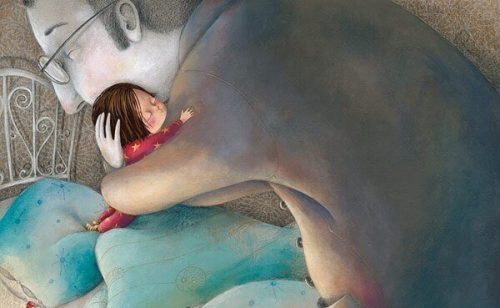Children and Their Magical Thinking

Magical thinking is a concept used in psychology that consists of visualizing or believing in something or someone that doesn’t exist.
Fairies, Santa Claus, witches, ghosts, and imaginary friends are just a few examples of this kind of thinking. The important thing for parents to be aware of is that this is a completely normal stage that most children go through.
What does magical thinking consist of?
Magical thinking is a stage that occurs between the 2 and 7 years of age. It’s a completely normal and even necessary phase in order to face certain fears and solve various situations.
This concept is defined within psychology as people’s belief of being able to modify their external environment through their own thoughts, and also through a supernatural kind of force.
During this stage, children believe in fantastic characters so much that they truly believe they accompany them every day. For example, their imagination can lead them to believe that mountains can move and, through that belief, they create an authentic adventure whenever they’re in a moving car.
“As children, we all live in a world of imagination, of fantasy, and for some of us that world of make-believe continues during adulthood.”
Jim Henson

Is magical thinking positive or negative for children?
Many parents worry about the great imagination their children can develop. In many cases, some parents wonder if it’s actually positive or not to reinforce beliefs such as Santa Claus and the tooth fairy, for example.
There’s no foundation that backs up parents’ negative thoughts about this stage. On the contrary, many experts in psychology assure that this childhood phase isn’t only normal but it’s also necessary for children’s development.
Children can develop magical thinking to such an extent that, eventually, it may even be difficult for them to establish a definite limit between reality and fantasy.
This isn’t a phase that should make parents worried since it’s completely normal and quite beneficial. In fact, thanks to this magical thinking, children can better develop their sensitivity. It can also give them an impulse to face their fears and other conflicts.
Magical thinking and its characteristics
- Magical thinking is a completely normal stage that usually develops between 2 and 7 years of age. However, it’s important to note that there’s no exact age at which this stage should end.
- Specialists explain that, when children turn 7 years old, their magical thoughts start to become more specific.
- Children begin to distinguish fantasy from reality, which makes them wonder even more about all of the things they don’t know. It’s at this time when children begin to develop a more logical kind of thinking, which then begins to collide with their previous, magical thinking.
- The magical thinking stage is key for children’s proper development because it encourages them to develop their imagination, creativity, and sensitivity. It also motivates children to face their fears and solve various conflicts.

When experiences and questions begin to arise
Some experts explain that these magical thoughts are what make children experience certain things more intensely. Since they’re unable to distinguish between fantasy and reality, they have a deeper perception of both positive and negative events.
It comes to a point where children’s thoughts start to become more concrete. Sooner or later, they begin to wonder about what’s real and what isn’t. That being said, it’s very important for parents to be present at this time to answer all of the doubts their child may have.
It’s not uncommon for parents to want to tell their child what is actually real. However, we recommend waiting until your child is curious and asks you.
Magical thinking is one of the most beautiful and positive stages during childhood. It’s a completely normal phase for children’s psychological and intellectual development.
Although it might be a little frustrating for some parents, let this stage last as long as children desire. If you notice they still have this fantastic thought-process, then so be it. Just make sure to pay attention and to be there for your children to answer every question they have.
“The true sign of intelligence is not knowledge but imagination.”
Albert Einstein
Magical thinking is a concept used in psychology that consists of visualizing or believing in something or someone that doesn’t exist.
Fairies, Santa Claus, witches, ghosts, and imaginary friends are just a few examples of this kind of thinking. The important thing for parents to be aware of is that this is a completely normal stage that most children go through.
What does magical thinking consist of?
Magical thinking is a stage that occurs between the 2 and 7 years of age. It’s a completely normal and even necessary phase in order to face certain fears and solve various situations.
This concept is defined within psychology as people’s belief of being able to modify their external environment through their own thoughts, and also through a supernatural kind of force.
During this stage, children believe in fantastic characters so much that they truly believe they accompany them every day. For example, their imagination can lead them to believe that mountains can move and, through that belief, they create an authentic adventure whenever they’re in a moving car.
“As children, we all live in a world of imagination, of fantasy, and for some of us that world of make-believe continues during adulthood.”
Jim Henson

Is magical thinking positive or negative for children?
Many parents worry about the great imagination their children can develop. In many cases, some parents wonder if it’s actually positive or not to reinforce beliefs such as Santa Claus and the tooth fairy, for example.
There’s no foundation that backs up parents’ negative thoughts about this stage. On the contrary, many experts in psychology assure that this childhood phase isn’t only normal but it’s also necessary for children’s development.
Children can develop magical thinking to such an extent that, eventually, it may even be difficult for them to establish a definite limit between reality and fantasy.
This isn’t a phase that should make parents worried since it’s completely normal and quite beneficial. In fact, thanks to this magical thinking, children can better develop their sensitivity. It can also give them an impulse to face their fears and other conflicts.
Magical thinking and its characteristics
- Magical thinking is a completely normal stage that usually develops between 2 and 7 years of age. However, it’s important to note that there’s no exact age at which this stage should end.
- Specialists explain that, when children turn 7 years old, their magical thoughts start to become more specific.
- Children begin to distinguish fantasy from reality, which makes them wonder even more about all of the things they don’t know. It’s at this time when children begin to develop a more logical kind of thinking, which then begins to collide with their previous, magical thinking.
- The magical thinking stage is key for children’s proper development because it encourages them to develop their imagination, creativity, and sensitivity. It also motivates children to face their fears and solve various conflicts.

When experiences and questions begin to arise
Some experts explain that these magical thoughts are what make children experience certain things more intensely. Since they’re unable to distinguish between fantasy and reality, they have a deeper perception of both positive and negative events.
It comes to a point where children’s thoughts start to become more concrete. Sooner or later, they begin to wonder about what’s real and what isn’t. That being said, it’s very important for parents to be present at this time to answer all of the doubts their child may have.
It’s not uncommon for parents to want to tell their child what is actually real. However, we recommend waiting until your child is curious and asks you.
Magical thinking is one of the most beautiful and positive stages during childhood. It’s a completely normal phase for children’s psychological and intellectual development.
Although it might be a little frustrating for some parents, let this stage last as long as children desire. If you notice they still have this fantastic thought-process, then so be it. Just make sure to pay attention and to be there for your children to answer every question they have.
“The true sign of intelligence is not knowledge but imagination.”
Albert Einstein
This text is provided for informational purposes only and does not replace consultation with a professional. If in doubt, consult your specialist.








